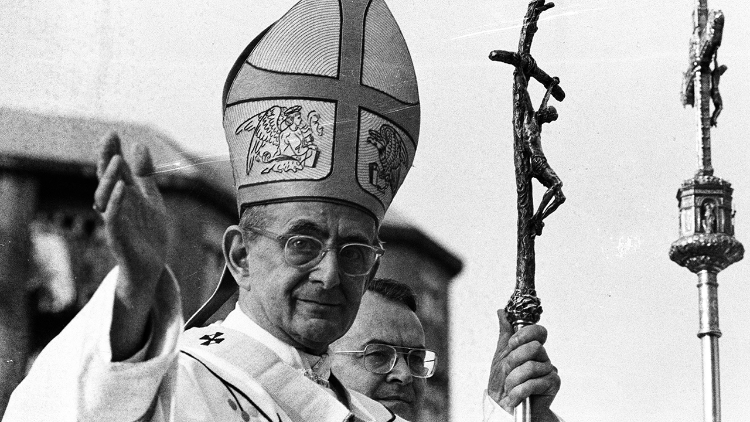
Pope Francis' letter and the letters of Paul VI
By Andrea Tornielli
Pope Francis follows in the footsteps of Paul VI. In an interview with the Spanish daily ABC, the Pope revealed on Sunday that he has done like his Brescian predecessor, whom he himself proclaimed a Saint.
The Pope recounts that he gave the then-Secretary of State, Cardinal Tarcisio Bertone, a resignation letter in case of 'health impediment'. We do not know the exact date of this document, but the reference to Cardinal Bertone as Secretary of State places it in the very first months of his pontificate, given that already in October 2013 Cardinal Pietro Parolin had taken over the role of principal collaborator of the Bishop of Rome.
Pope Francis' letter follows the path of Pope Paul VI, as several witnesses in previous decades had spoken of Paul VI's resignation letters, until May 2018 when they were made public by the Regent of the Pontifical Household, Monsignor Leonardo Sapienza.
A Montini scholar and author of many books on Paul VI, who led the Church from 1963 to 1978, bringing the Second Vatican Ecumenical Council and the first 13 years of its implementation to completion, Msgr. Sapienza's book contains these documents of Paul VI in a volume entitled "La barca di Paolo" (The Barque of Paul), published by Edizioni San Paolo.
The 2018 book publishes the declarations in which Paul VI writes that "in the case of infirmity, which is presumed incurable, or of long duration... or in the case of any other serious and prolonged impediment," he resigns the office of pope. The letter is written in Paul VI's very clear handwriting and is dated 2 May 1965. It was therefore handwritten by the Pope from Brescia, not when he was elderly or ill, but just two years after his election with the Second Vatican Council still underway. With these texts, the Pope wished to shelter the Church from a long incapacity, marking a letter of resignation prepared in advance and when necessary to be delivered to the Cardinal Dean so that it could be communicated to the other cardinals in order to declare that pope had stepped down.
There were actually two letters from Pope Paul VI, because together with the resignation letter there is an accompanying document addressed to the Secretary of State that is certainly the strongest text. And it is significant that that document was also commented upon by Pope Francis, who in his own words published in Msgr. Sapienza's book writes: "I read with amazement these letters of Paul VI that I see as a humble and prophetic testimony of love for Christ and his Church; and further proof of the holiness of this great Pope... What matters to him are the needs of the Church and the world. And a Pope prevented by serious illness would not be able to exercise his apostolic ministry effectively enough."
The text of the main letter, marked as "confidential" and addressed to the Dean of the Sacred College on letterhead with the papal coat of arms, opens with these words: 'We Paul the Sixth, by divine Providence Bishop of Rome and Pontiff of the universal Church, in the presence of the Most Holy Trinity Father, Son and Holy Spirit, - invoking the name of Jesus Christ, our Master, our Lord and our Saviour...'. This is followed by an entrustment to Mary and Joseph. Then come the formulation of the resignation with the details. "We declare: in the case of infirmity, which is presumed to be incurable, or of long duration, and which prevents us from sufficiently exercising the functions of our apostolic ministry; or in the case that other grave and prolonged impediment to this is likewise an obstacle, to renounce our sacred and canonical office, both as Bishop of Rome, and as Head of the same Holy Catholic Church, in the hands of the Lord Cardinal Dean... Leaving to him, together at least with the Cardinals in charge of the Dicasteries of the Roman Curia and our Cardinal Vicar for the city of Rome... the faculty of accepting and putting into effect this resignation of ours, which only the higher good of Holy Church calls upon us." At the bottom are the handwritten signature and date, "at Saint Peter's, on Good Shepherd Sunday, the second after Easter, 2 May 1965, the second of our Pontificate".
It is interesting to note that Paul VI does not only refer to an illness, but also to the possibility of "another serious and prolonged impediment". According to those close to Pope Paul VI, these circumstances could relate to what some authoritative witnesses of Pius XII had established at the time, when his resignation could have been invoked in the event of his abduction by Hitler at the height of the Second World War. This would have allowed the cardinals to meet, perhaps in a neutral and safe country, to elect a new Bishop of Rome to replace the one who had become a prisoner of the Nazi dictator.
Lastly, it is worth noting that in the case of both Paul VI and Francis, we are dealing with a "preventive" letter, one that refers to situations in which the Pope finds himself unable to step down from his office freely and in full conscience. These are therefore letters that are for different circumstances, compared to the one for Benedict XVI's resignation that took place almost ten years ago.
(Translation from original article in Italian)
Thank you for reading our article. You can keep up-to-date by subscribing to our daily newsletter. Just click here










